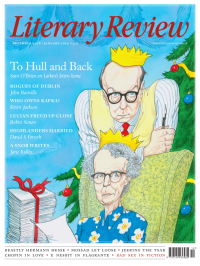Violet Hudson
If Art Critics Ruled the World
On Wandsworth Bridge
By Hattie Pond
Sylph Editions 351pp £14
On Wandsworth Bridge is many things. It is an acerbic satire on the art world. It is a sci-fi novel in which time travel features freely. It is a love story. It is a feminist exploration of the place of women in the world, now and in the future. It is a warning against cults and demagogues. But what it is mostly is a highly original, very strange, wonderful read.
The story opens with a gathering at an art gallery in a city called Lundenwic. Hugo de Lamartine – born Hugh Fisher – has recently published an incomprehensible book on photography entitled Trapped Light. Thanks to sentences such as ‘I am pressed into combat with a differing paradigm, my incorporeal self confronting the choppy waves of another reality’, he has gained access to the inner circle of the art world. He is a monstrous egomaniac and lazy to boot. He has changed his name to sound more exotic. At one point he asks, unironically, ‘can’t we talk about something more interesting … like Art or photography or me.’ Hugo is a poseur of preposterous proportions. He could be anyone at the opening night of a Mayfair exhibition.
Meanwhile, ‘elsewhen’, in a time-travelling vessel at the bottom of the Thames underneath Wandsworth Bridge, Sidney Ng and Posy Bollunk are tracking Hugo’s movements. They come from sixty years hence and know that Hugo will change the course of history. His inane pronouncements will lead to the creation

Sign Up to our newsletter
Receive free articles, highlights from the archive, news, details of prizes, and much more.@Lit_Review
Follow Literary Review on Twitter
Twitter Feed
Under its longest-serving editor, Graydon Carter, Vanity Fair was that rare thing – a New York society magazine that published serious journalism.
@PeterPeteryork looks at what Carter got right.
Peter York - Deluxe Editions
Peter York: Deluxe Editions - When the Going Was Good: An Editor’s Adventures During the Last Golden Age of Magazines by Graydon Carter
literaryreview.co.uk
Henry James returned to America in 1904 with three objectives: to see his brother William, to deliver a series of lectures on Balzac, and to gather material for a pair of books about modern America.
Peter Rose follows James out west.
Peter Rose - The Restless Analyst
Peter Rose: The Restless Analyst - Henry James Comes Home: Rediscovering America in the Gilded Age by Peter Brooks...
literaryreview.co.uk
Vladimir Putin served his apprenticeship in the KGB toward the end of the Cold War, a period during which Western societies were infiltrated by so-called 'illegals'.
Piers Brendon examines how the culture of Soviet spycraft shaped his thinking.
Piers Brendon - Tinker, Tailor, Sleeper, Troll
Piers Brendon: Tinker, Tailor, Sleeper, Troll - The Illegals: Russia’s Most Audacious Spies and the Plot to Infiltrate the West by Shaun Walker
literaryreview.co.uk